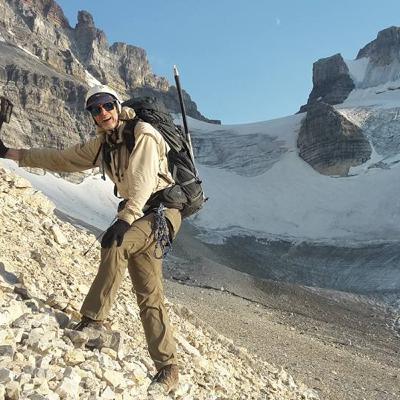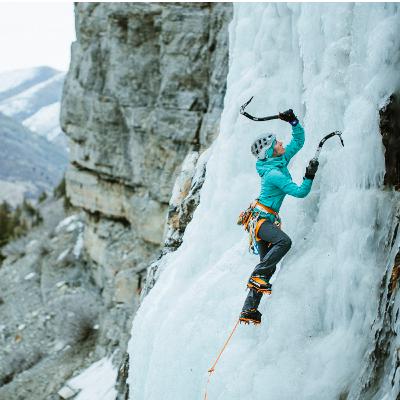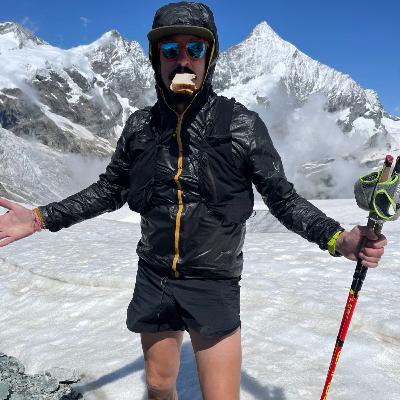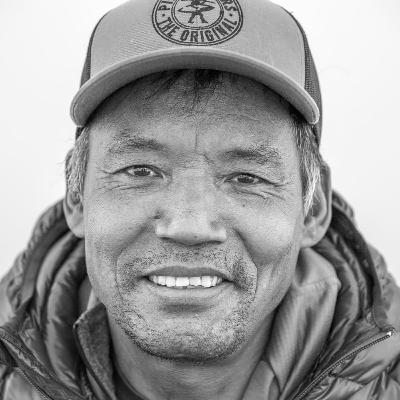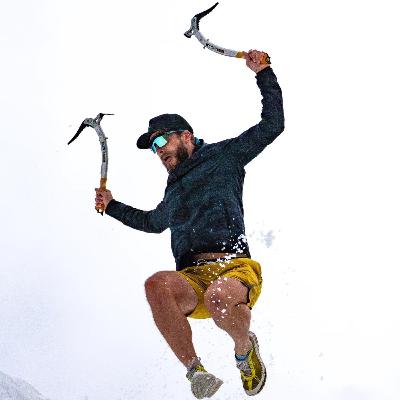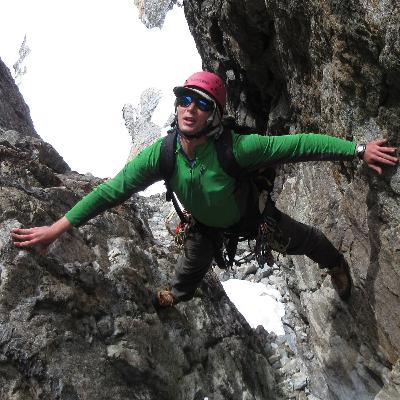Discover The We Like It On Top Podcast
The We Like It On Top Podcast

The We Like It On Top Podcast
Author: Bill Goodgion
Subscribed: 0Played: 1Subscribe
Share
© Bill Goodgion
Description
Are you a hiker, climber, mountaineer or alpinist that loves to be on the top of mountains?
We Like It On Top is an international community of people who are passionate about hiking and climbing mountains- anywhere in the world.
In our episodes, founder and host Bill Goodgion speaks with inspirational mountaineers and climbers that are doing extraordinary things in the mountains!
To learn more about us, visit our website at www.welikeitontop.com
See You At The Top!
We Like It On Top is an international community of people who are passionate about hiking and climbing mountains- anywhere in the world.
In our episodes, founder and host Bill Goodgion speaks with inspirational mountaineers and climbers that are doing extraordinary things in the mountains!
To learn more about us, visit our website at www.welikeitontop.com
See You At The Top!
8 Episodes
Reverse
Summary:
Deanna Molenda shares her journey of recovery and rediscovering her love for the outdoors. She discusses her pre-sobriety hiking experiences and how she had to cut hiking out of her life during her early years of sobriety. Deanna then joins OSAT, a mountaineering program for people in recovery, and finds a supportive community. She overcomes her fears and takes on challenging climbs, including Mount Rainier and Aconcagua. Deanna emphasizes the importance of setting boundaries and vetting people in the outdoor community. She also talks about her future mountaineering objectives and the transformative power of small challenges.
Takeaways:
Recovery and sobriety can open up new opportunities for personal growth and rediscovering passions.
Building a supportive community is crucial for overcoming challenges and finding like-minded individuals.
Setting boundaries and communicating intentions are essential in navigating the outdoor community.
Embracing small challenges and transformations can lead to personal growth and a sense of accomplishment.
Chapters:
00:00 Pre-Sobriety and Early Hiking
06:16 Recovery and Introduction to OSAT
08:09 Joining OSAT and Beginner Climbing Course
09:49 Building Community and Finding Support
11:08 Climbing Mount Rainier and Rediscovering Strength
12:49 Opportunity to Climb Aconcagua
14:07 Overcoming Fear and Taking Opportunities
17:47 Transformation and Life-Changing Connections
19:29 Navigating Challenges in the Outdoor Community
25:18 Setting Boundaries and Vetting People
27:35 Importance of Communication and Respect
29:42 Embracing Monotony and Small Transformations
35:24 Future Mountaineering Objectives
38:08 Approaching Challenges and Transformation
41:18 Learning to Fly and Overcoming Fears
45:23 Working with Brands and Building Relationships
50:02 Upcoming Adventures and Rest
54:46 Fitness Routine and Instagram
56:11 The Story Behind the Nickname 'Ladybug'
Summary:
In this episode of the We Like It On Top podcast, host Bill Goodgion interviews Greg Slayden, the founder of peakbagger.com. They discuss Greg's background in climbing and his journey to becoming a peak bagger. They also explore the challenges and rewards of climbing in the White Mountains and completing state high points. Greg shares his training regimen and highlights some of his most memorable climbs. They delve into the features and statistics of peakbagger.com, including the number of peaks, active accounts, and logged ascents. Greg also discusses the infrastructure challenges of running the website and the importance of user privacy.
Takeaways:
Peak bagging is a hobby that involves climbing and documenting the ascents of various peaks.
The White Mountains in New Hampshire offer a unique hut system that allows hikers to traverse the range without carrying camping gear.
Training for climbing can involve a variety of outdoor activities, and being active in the mountains can be a form of training in itself.
Peak baggers often have a wide range of skills and experience due to their exposure to different mountains and conditions.
PeakBagger.com is a comprehensive database of mountain peaks and climbing information, with features such as logging ascents and connecting with other climbers.
Chapters:
(00:00) Introduction to We Like It On Top
(01:02) Greg's Background and Peak Bagger
(03:26) Hiking in the White Mountains
(04:20) Mount Washington and State High Points
(05:15) Hut System in the White Mountains
(06:04) Training and Preparation for Climbing
(08:28) Challenges of Climbing in the White Mountains
(11:09) Transition to State High Points
(13:10) Completing the State High Points
(14:17) Training Regimen for Climbing
(16:10) Skills and Variety of Peak Baggers
(17:39) Definition of a Peak Bagger
(19:02) Greg's Climbing Stats
(21:46) Most Challenging and Fulfilling Climbs
(25:37) Overview of PeakBagger.com
(30:33) Building PeakBagger.com
(35:03) Infrastructure Challenges
(37:29) Features and Highlights of PeakBagger.com
check out: www.peakbagger.com
To learn more about us, visit: www.welikeitontop.com
#welikeitontop
Summary:
Kimber Cross, an adaptive climber, shares her journey of growing up on a farm, choosing not to use prosthetics, and adapting and modifying to excel in sports. She discusses the impact of representation and the power of social media in finding role models. Kimber also talks about teaching children about the outdoors and inspiring the next generation. She shares her experiences in mountaineering and climbing, including using a prosthetic for climbing. Kimber discusses her participation in the North Face Athlete Development Program and her goals in skiing off summits. She offers advice on how to engage with adaptive climbers. Kimber Cross discusses the power of exposure and inclusion, the interconnectedness of her identities, the importance of discipline and teachability, breaking stereotypes, the mantra 'If you don't quit, you win', the shift in representation in mountaineering, the scaffolding for success, the transformational power of mountaineering, the camaraderie and learning in challenging environments, and provoking and inspiring others.
Takeaways:
Exposure and inclusion lead to greater acceptance and understanding of different cultures and perspectives.
Interconnected identities shape who we are and should be valued equally.
Discipline and teachability are essential qualities for achieving success in any field.
Breaking stereotypes is an ongoing process that requires representation and exposure to diverse experiences.
Persistence and resilience are key to overcoming challenges and achieving success.
The representation of diverse voices and experiences in mountaineering is increasing, leading to a more inclusive community.
Supportive communities and opportunities for growth are crucial for personal and professional development.
Mountaineering fosters personal growth, empathy, and understanding through shared experiences and challenges.
Camaraderie and learning in challenging environments provide unique opportunities for personal growth and connection.
Provoking and inspiring others can lead to deeper personal and societal change.
Follow Kimber Cross on Instagram, TikTok, and her website for inspiration and to support her work with kids in the mountains and in the classroom.
Chapters:
(0:00) Introduction and Background
(02:23) Growing Up on a Farm
(03:46) Choosing Not to Use Prosthetics
(06:06) Adapting and Modifying to Excel in Sports
(08:55) The Impact of Representation
(10:22) Overcoming Embarrassment and Shame
(11:51) Teasing and Self-Image
(14:07) Finding Representation and Role Models
(16:29) The Power of Social Media
(17:54) Teaching Children about the Outdoors
(19:47) Inspiring the Next Generation
(23:03) The Impact of Education
(26:55) Combining Teaching and Climbing
(27:24) Getting into Mountaineering and Climbing
(30:37) Using a Prosthetic for Climbing
(35:15) Joining the North Face Athlete Development Program
(38:32) Skiing Off Summits and Goals
(45:49) Engaging with Adaptive Climbers
(50:42) The Power of Exposure and Inclusion
(51:08) Interconnected Identities
(52:07) Discipline and Teachability
(53:05) Breaking Stereotypes
(54:02) If You Don't Quit, You Win
(54:58) The Shift in Representation
(55:52) Scaffolding for Success
(56:48) The Transformational Power of Mountaineering
(57:44) Camaraderie and Learning in Challenging Environments
(58:08) Provoking and Inspiring Others
(59:06) Where to Follow Kimber Cross
to learn more about Kimber, visit: www.kimberbelle.com
to learn more about us, visit: www.welikeitontop.com
Meet Jason Green. Founder of Yeti Trail Runners.
Summary:
In this episode, host Bill Goodgion interviews Jason Green, the founder of Yeti Trail Runners. They discuss Jason's background, his transition from running to peak bagging, and the values and inclusivity of the Yeti Army. Jason shares his love for Dolly Parton and the song that defines him. He also offers advice for beginners and emphasizes the importance of mentors and a supportive community. The conversation highlights the joy and fulfillment of outdoor activities and the need for human connections in today's tech-driven world.
Takeaways:
Embrace your true self and don't let ego get in the way of pursuing your passions.
Create a welcoming and inclusive community that celebrates everyone, regardless of their speed or ability.
Be open to learning new skills and starting from zero, even as an adult.
Don't be afraid to make mistakes and be willing to change your mind.
Seek out mentors and surround yourself with supportive people who share your values.
Remember the importance of human connections and the joy of outdoor activities.
Chapters:
(00:00) Introduction and Background
(01:02) Jason's Life and Adventures
(02:28) From Smoking to Running Ultras
(03:26) Creating the Yeti Army
(07:16) The Difference of Yeti Ultra Marathons
(08:39) The Importance of Inclusivity
(09:38) The Rules and Values of Yeti Trail Runners
(11:35) The Influence of Family and Appalachia
(13:57) Creating a Safe and Welcoming Environment
(17:46) Transitioning from Running to Peak Bagging
(19:36) Meeting Bill and Exploring the PNW
(21:29) Learning New Skills and Overcoming Ego
(23:38) The Importance of Mentors
(25:06) Dealing with Criticism and Mistakes
(27:04) Jason's Injury and Recovery
(29:29) Jason's Peak Bagging Count
(34:14) Jason's Approach to Peak Bagging
(37:28) Jason's Love for Dolly Parton
(39:50) The Song that Defines Jason
(42:39) Lightning Round
(46:43) Advice for Beginners
(49:02) How to Follow Jason and Yeti Trail Runners
(50:19) Conclusion
to learn more about Yeti Trail Runners, visit: www.yetitrailrunners.com
to learn more about us, visit: www.welikeitontop.com
Lakpa Rita Sherpa is one of the most well known and respected mountain guides in the world. Born and raised in the small village of Thame, Nepal Lakpa followed the footsteps of his father and began his first mountaineering expedition at the age of 18 in 1984. From what began as a job, Lakpa soon realized mountaineering was his true passion. On October 7th of 1990, Lakpa made his first summit to Mt. Everest and since then, he has made over 17 summits, and led 36 expeditions, guiding a record of 254 climbers to the summit.
Lakpa moved to the United States in 2000 and started working as a full-time mountain guide around the world, leading expeditions in Alaska, Antarctica, and South America. In 2009, he became the first Sherpa to climb the seven summits. Lakpa was also named Outside Magazine’s “Adventurer of the Year” in 2013.
He also has 62 Summits of Aconcagua, 150+ summits of Mt Rainier, and 18 summits of Vinson. He has guided on K2, Broad Peak, Annapurna, Manaslu, Dhaulagari and Makalu.
Lakpa has now been guiding full time for over 30 years worldwide with several different guiding companies.
Summary:
Lakpa Rita Sherpa, a renowned mountain guide, shares his experiences and insights on mountaineering. He discusses his inspiration from Sir Edmund Hillary and Tenzing Norgay, his first climb on Everest and a harrowing avalanche experience. Lakpa also talks about the changes in climbing on Everest, the increase in commercial expeditions, and the recognition of Nepalese climbers. He addresses misconceptions about Sherpas and porters and compares the climbing approaches in the Himalaya and other parts of the world. Lakpa shares his favorite places to climb outside of Nepal and his future plans. He offers advice for beginner mountaineers and discusses his daily routines for staying in shape and maintaining a healthy lifestyle.
Takeaways:
Lakpa Rita Sherpa was inspired to climb Everest after a visit from Sir Edmund Hillary and Tenzing Norgay to his school.
The climbing season on Everest has shifted from fall to spring due to better weather conditions and reduced avalanche risks.
The commercialization of Everest has led to a significant increase in the number of climbers, with up to 800-1000 people attempting to summit each season.
Sherpas play a crucial role in supporting climbers on Everest and are essential for the success of expeditions.
Lakpa Rita Sherpa recommends starting with hiking and gradually increasing the weight carried to prepare for mountaineering.
Chapters
(00:00) Introduction and Background
(02:39) Inspiration from Sir Edmund Hillary and Tenzing Norgay
(06:00) First Climb on Everest and Avalanche Experience
(09:48) Changes in Climbing on Everest
(11:14) Shift from Fall to Spring Climbing Season
(12:42) Emotional First Summit and Spiritual Connection
(15:35) Changes in Climbing Industry and Recognition of Nepalese Climbers
(17:00) Increase in Commercial Expeditions on Everest
(20:22) Misconceptions about Sherpas and Porters
(23:41) Comparison of Climbing Approaches in the Himalaya and Other Parts of the World
(25:34) Changes in Standard of Living and Income for Climbers in Nepal
(31:16) Favorite Places to Climb Outside of Nepal
(32:42) Dream Climb and Future Plans
(36:34) Staying in Shape and Healthy Lifestyle
(38:00) Advice for Beginner Mountaineers
(40:25) Where to Find More Information about Lakpa Rita Sherpa
(41:20) Closing Remarks
To learn more about Lakpa Rita Sherpa, visit his website at www.khangriexperience.com
To learn more about We Like It On Top, visit our website at www.welikeitontop.com
Jason Hardrath is a teacher, runner and mountaineer based in southern Oregon. He holds more Fastest Known Times (FKTs) than any other athlete in the world. In 2021, he broke the record for the fastest known time to summit the 100 tallest peaks in Washington State known as the Bulger List— and he did it in only 50 days.
Summary:
In this conversation, Bill Goodgion interviews Jason Hardrath, the protagonist of the documentary 'Journey to Infinity.' Jason shares his journey from a life-altering car accident to becoming a record-breaking FKT (Fastest Known Time) crusher. He discusses his transition to hiking and rock climbing after the accident and his passion for technical and mountainous terrain. Jason also talks about his experience completing the Rainier Infinity Loop and his goal to establish the first infinity loop on each of the volcanic seven summits. The conversation delves into the process of submitting evidence for FKTs and the tension and conflict portrayed in the documentary.
Takeaways:
Jason Hardrath's journey from a car accident to becoming a record-breaking FKT crusher is inspiring and showcases the power of resilience and determination.
The Rainier Infinity Loop, a 140-mile route with 47,000 feet of elevation gain, was a significant breakthrough for Jason and fueled his passion for technical terrain.
Jason's goal to establish the first infinity loop on each of the volcanic seven summits demonstrates his ambition and love for challenging adventures.
The documentary 'Journey to Infinity' explores the human element and the tension between Jason and his friend Nathan Longhurst during their attempt at the Pico de Orizaba infinity loop.
Chapters:
(00:00) Introduction and Background
(02:20) Life-Altering Car Accident
(03:49) Transition to Hiking and Rock Climbing
(05:18) The Rainier Infinity Loop
(06:45) The Volcanic Seven Summits
(09:02) Discovering FKTs
(11:24) Submitting Evidence for FKTs
(16:04) Journey to Infinity Documentary
(18:42) Dealing with Altitude Pulmonary Edema
(21:57) Tension and Conflict in the Documentary
(22:26) Where to Follow Jason Hardrath
#welikeittop
You can learn more about Jason and follow his latest at:
www.jasonhardrath.com
To learn more about We Like It On Top, visit our website at www.welikeitontop.com
Eric Gilbertson lives in Seattle, WA, where he is a professor in mechanical engineering at Seattle University. He learned mountaineering skills from friends in the MIT Outing club, and climbed the US state highpoints while in grad school at MIT. He’s made over 70 first ascents, including peaks in northwest territories, Ellesmere Island, Washington and Uzbekistan. Now he’s working on climbing the highest mountain in every country in the world. In recent years he’s made it up some of the toughest ones like Pik Pobeda (Kyrgyzstan), K2 (Pakistan), Noshaq (Afghanistan), and this year Kangchenjunga (India). Sometimes the true country highpoint is unknown or unclimbed, and he brings professional survey equipment to figure it out. He’s at 140 country highpoints now with 56 left to go.
Summary:
In this episode of the We Like It On Top podcast, host Bill Goodgion interviews mountaineer and surveyor Eric Gilbertson. Eric discusses his passion for climbing and surveying the highest peaks in Washington and around the world. He shares his experiences using professional survey equipment to accurately measure peak elevations and the challenges he faces in validating his results. Eric also talks about his climbing adventures in Uzbekistan and his plans for future expeditions. Despite not having sponsors, Eric has mastered the art of budget travel, allowing him to pursue his climbing goals.
Takeaways:
Eric Gilbertson combines his love for climbing with surveying to accurately measure peak elevations.
Using professional survey equipment, Eric aims to create the most accurate list of the highest mountains in Washington.
Eric's surveying results have led to the discovery of previously unknown peaks and changes to existing peak lists.
Eric faces challenges in validating his surveying results and making them official.
Chapters:
(00:00) Introduction and Background
(02:44) Surveying the Highest Peaks in Washington
(05:11) Reactions to Surveying Results
(08:02) Getting Started in Surveying
(10:23) Validating Survey Results
(11:47) Surveying Equipment
(15:33) Combining Surveying with Climbing
(16:30) Climbing in Uzbekistan
(23:41) Climbing Alpomish and Khazrat Sultan
(28:28) Difficulties and Challenges Ahead
(31:40) Traveling on a Budget
(34:32) Conclusion
You can learn more about Eric and follow his adventures at:
https://www.countryhighpoints.com
To learn more about We Like It On Top, visit our website at www.welikeitontop.com
Do you love being on the top of mountains? So do we!



